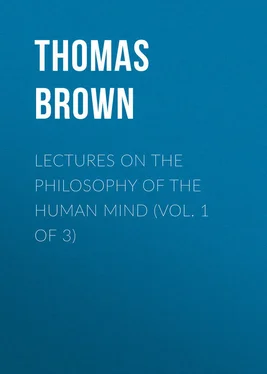Thomas Brown - Lectures on the Philosophy of the Human Mind (Vol. 1 of 3)
Здесь есть возможность читать онлайн «Thomas Brown - Lectures on the Philosophy of the Human Mind (Vol. 1 of 3)» — ознакомительный отрывок электронной книги совершенно бесплатно, а после прочтения отрывка купить полную версию. В некоторых случаях можно слушать аудио, скачать через торрент в формате fb2 и присутствует краткое содержание. Жанр: foreign_antique, foreign_prose, на английском языке. Описание произведения, (предисловие) а так же отзывы посетителей доступны на портале библиотеки ЛибКат.
- Название:Lectures on the Philosophy of the Human Mind (Vol. 1 of 3)
- Автор:
- Жанр:
- Год:неизвестен
- ISBN:нет данных
- Рейтинг книги:5 / 5. Голосов: 1
-
Избранное:Добавить в избранное
- Отзывы:
-
Ваша оценка:
- 100
- 1
- 2
- 3
- 4
- 5
Lectures on the Philosophy of the Human Mind (Vol. 1 of 3): краткое содержание, описание и аннотация
Предлагаем к чтению аннотацию, описание, краткое содержание или предисловие (зависит от того, что написал сам автор книги «Lectures on the Philosophy of the Human Mind (Vol. 1 of 3)»). Если вы не нашли необходимую информацию о книге — напишите в комментариях, мы постараемся отыскать её.
Lectures on the Philosophy of the Human Mind (Vol. 1 of 3) — читать онлайн ознакомительный отрывок
Ниже представлен текст книги, разбитый по страницам. Система сохранения места последней прочитанной страницы, позволяет с удобством читать онлайн бесплатно книгу «Lectures on the Philosophy of the Human Mind (Vol. 1 of 3)», без необходимости каждый раз заново искать на чём Вы остановились. Поставьте закладку, и сможете в любой момент перейти на страницу, на которой закончили чтение.
Интервал:
Закладка:
I have thus briefly sketched the various important inquiries, which the philosophy of mind, in its most extensive sense, may be said to comprehend. The nature of our spiritual being, as displayed in all the phenomena of feeling and thought – the ties which bind us to our fellow-men, and to our Creator – and the prospect of that unfading existence, of which life is but the first dawning gleam; such are the great objects to which in the department of your studies committed to my charge, it will be my office to guide your attention and curiosity. The short period of the few months to which my course is necessarily limited, will not, indeed, allow me to prosecute, with such full investigation as I should wish, every subject that may present itself in so various a range of inquiry. But even these few months, I flatter myself, will be sufficient to introduce you to all which is most important for you to know in the science, and to give such lights as may enable you, in other hours, to explore, with success, the prospects that here, perhaps, may only have opened on your view. It is not, I trust, with the labours of a single season that such inquiries, on your part, are to terminate. Amid the varied occupations and varied pleasures of your future years, – in the privacy of domestic enjoyment, as much as in the busier scenes of active exertion, – the studies on which you are about to enter must often rise to you again with something more than mere remembrance; because there is nothing that can give you interest, in any period or situation of your life, to which they are not related. The science of mind, is the science of yourselves; of all who surround you; of every thing which you enjoy or suffer, or hope or fear: so truly the science of your very being, that it will be impossible for you to look back on the feelings of a single hour, without constantly retracing phenomena that have been here, to a certain extent, the subjects of your analysis and arrangement. The thoughts and faculties of your own intellectual frame, and all which you admire as wonderful in the genius of others, – the moral obligation, which, as obeyed or violated, is ever felt by you with delight or with remorse, – the virtues, of which you think as often as you think of those whom you love; and the vices, which you view with abhorrence, or with pity, – the traces of divine goodness, which never can be absent from your view, because there is no object in nature which does not exhibit them, – the feeling of your dependence on the gracious Power that formed you, – and the anticipation of a state of existence more lasting than that which is measured by the few beatings of a feeble pulse, – these in their perpetual recurrence, must often recal to you the inquiries that, in this place, engaged your early attention. It will be almost as little possible for you to abandon wholly such speculations, as to look on the familiar faces of your home with a forgetfulness of every hour which they have made delightful, or to lose all remembrance of the very language of your infancy, that is every moment sounding in your ears.
Though I shall endeavour, therefore, to give as full a view as my limits will permit of all the objects of inquiry which are to come before us, it will be my chief wish to awake in you, or to cherish, a love of these sublime inquiries themselves. There is a philosophic spirit which is far more valuable than any limited acquirements of philosophy; and the cultivation of which, therefore, is the most precious advantage that can be derived from the lessons and studies of many academic years: – a spirit, which is quick to pursue whatever is within the reach of human intellect; but which is not less quick to discern the bounds that limit every human inquiry, and which, therefore, in seeking much, seeks only what man may learn: – which knows how to distinguish what is just in itself from what is merely accredited by illustrious names; adopting a truth which no one has sanctioned, and rejecting an error of which all approve, with the same calmness as if no judgment were opposed to its own: – but which, at the same time, alive, with congenial feeling, to every intellectual excellence, and candid to the weakness from which no excellence is wholly privileged, can dissent and confute without triumph, as it admires without envy; applauding gladly whatever is worthy of applause in a rival system, and venerating the very genius which it demonstrates to have erred.
Such is that philosophic temper to which, in the various discussions that are to occupy us, it will be my principal ambition to form your minds; with a view not so much to what you are at present, as to what you are afterwards to become. You are now, indeed, only entering on a science, of which, by many of you, perhaps, the very elements have never once been regarded as subjects of speculative inquiry. You have much, therefore, to learn, even in learning only what others have thought. But I should be unwilling to regard you as the passive receivers of a system of opinions, content merely to remember whatever mixture of truths and errors may have obtained your easy assent. I cannot but look to you in your maturer character, as yourselves the philosophers of other years; as those who are, perhaps, to add to science many of its richest truths, which as yet are latent to every mind, and to free it from many errors, in which no one has yet suspected even the possibility of illusion. The spirit which is itself to become productive in you, is therefore, the spirit which I wish to cultivate; and happy, as I shall always be, if I succeed in conveying to you that instruction which it is my duty to communicate, I shall have still more happiness if I can flatter myself, that, in this very instruction, I have trained you to habits of thought, which may enable you to enrich, with your own splendid discoveries, the age in which you live, and to be yourselves the instructors of all the generations that are to follow you.
LECTURE II
RELATION OF THE PHILOSOPHY OF MIND TO THE SCIENCES IN GENERAL
In my former Lecture, Gentlemen, I gave you a slight sketch of the departments into which the Philosophy of Mind divides itself, comprehending, in the first place, The physiology of the mind, considered as a substance capable of the various modifications, or states, which constitute, as they succeed each other, the phenomena of thought and feeling; secondly , The doctrines of general ethics, as to the obligation, under which man lies, to increase and extend, as widely as possible, the happiness of all that live; thirdly , The political doctrines, as to the means which enable him, in society with his fellow men, to furthermost successfully, and with the least risk of future evil, that happiness of all, which it is the duty of each individually to wish and to promote; and, fourthly , The doctrines of natural theology, as to the existence and attributes of that greatest of Beings, under whose moral government we live, and the foundations of our confidence that death is only a change of scene, which, with respect to our mortality indeed, may be said to be its close; but which, with respect to the soul itself, is only one of the events of a life that is everlasting.
Of these great divisions of our subject, the Physiology of the Mind , or the consideration of the regular series of phenomena which it presents, simply as states or affections of the mind, is that to which we are first to turn our attention. But, before entering on it, it may be useful to employ a few Lectures in illustrating the advantages , which the study of the mind affords, and the principles of philosophizing , in their peculiar application to it – subjects, which, though of a general kind, will, I trust, leave an influence that will be felt in all the particular inquiries in which we are to be engaged; preparing you, both for appreciating better the importance of those inquiries, and for prosecuting them with greater success.
Читать дальшеИнтервал:
Закладка:
Похожие книги на «Lectures on the Philosophy of the Human Mind (Vol. 1 of 3)»
Представляем Вашему вниманию похожие книги на «Lectures on the Philosophy of the Human Mind (Vol. 1 of 3)» списком для выбора. Мы отобрали схожую по названию и смыслу литературу в надежде предоставить читателям больше вариантов отыскать новые, интересные, ещё непрочитанные произведения.
Обсуждение, отзывы о книге «Lectures on the Philosophy of the Human Mind (Vol. 1 of 3)» и просто собственные мнения читателей. Оставьте ваши комментарии, напишите, что Вы думаете о произведении, его смысле или главных героях. Укажите что конкретно понравилось, а что нет, и почему Вы так считаете.












![Anne Blunt - A Pilgrimage to Nejd, the Cradle of the Arab Race. Vol. 1 [of 2]](/books/749489/anne-blunt-a-pilgrimage-to-nejd-the-cradle-of-the-thumb.webp)